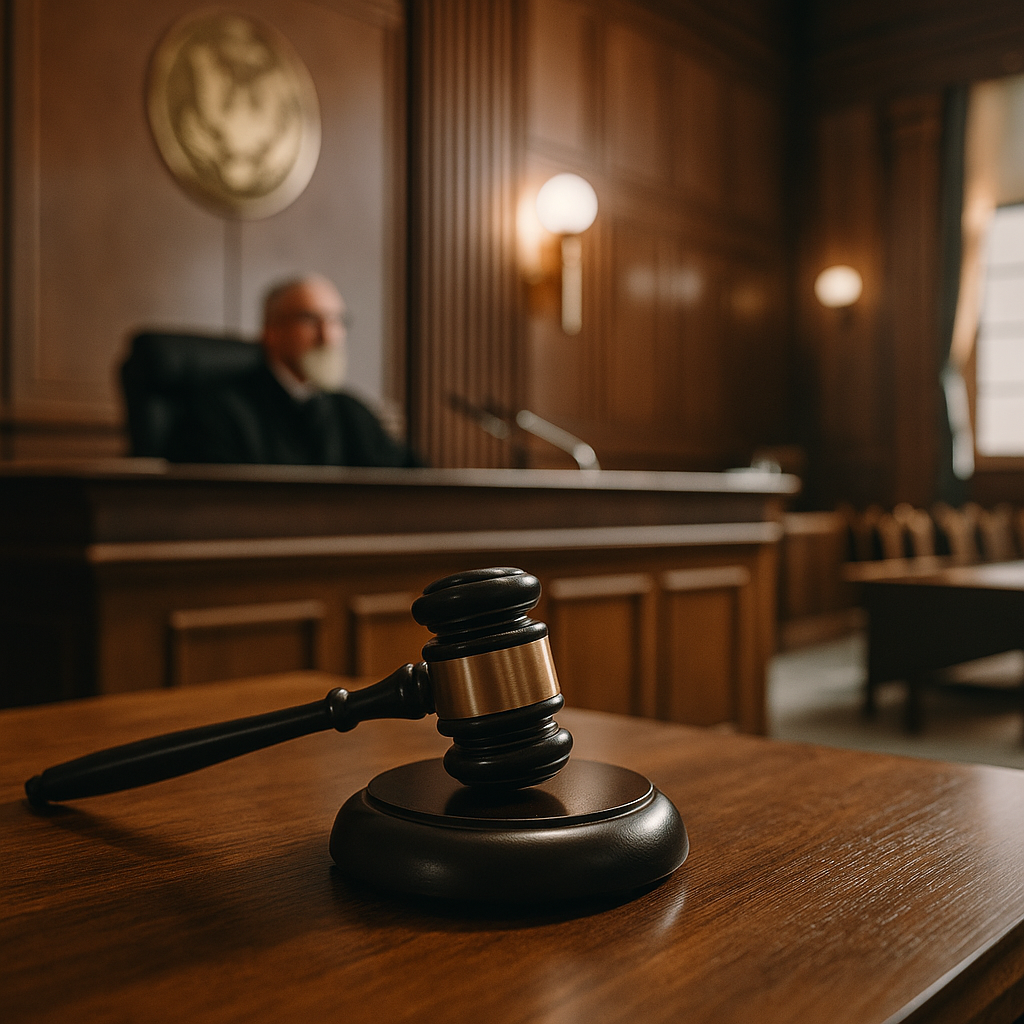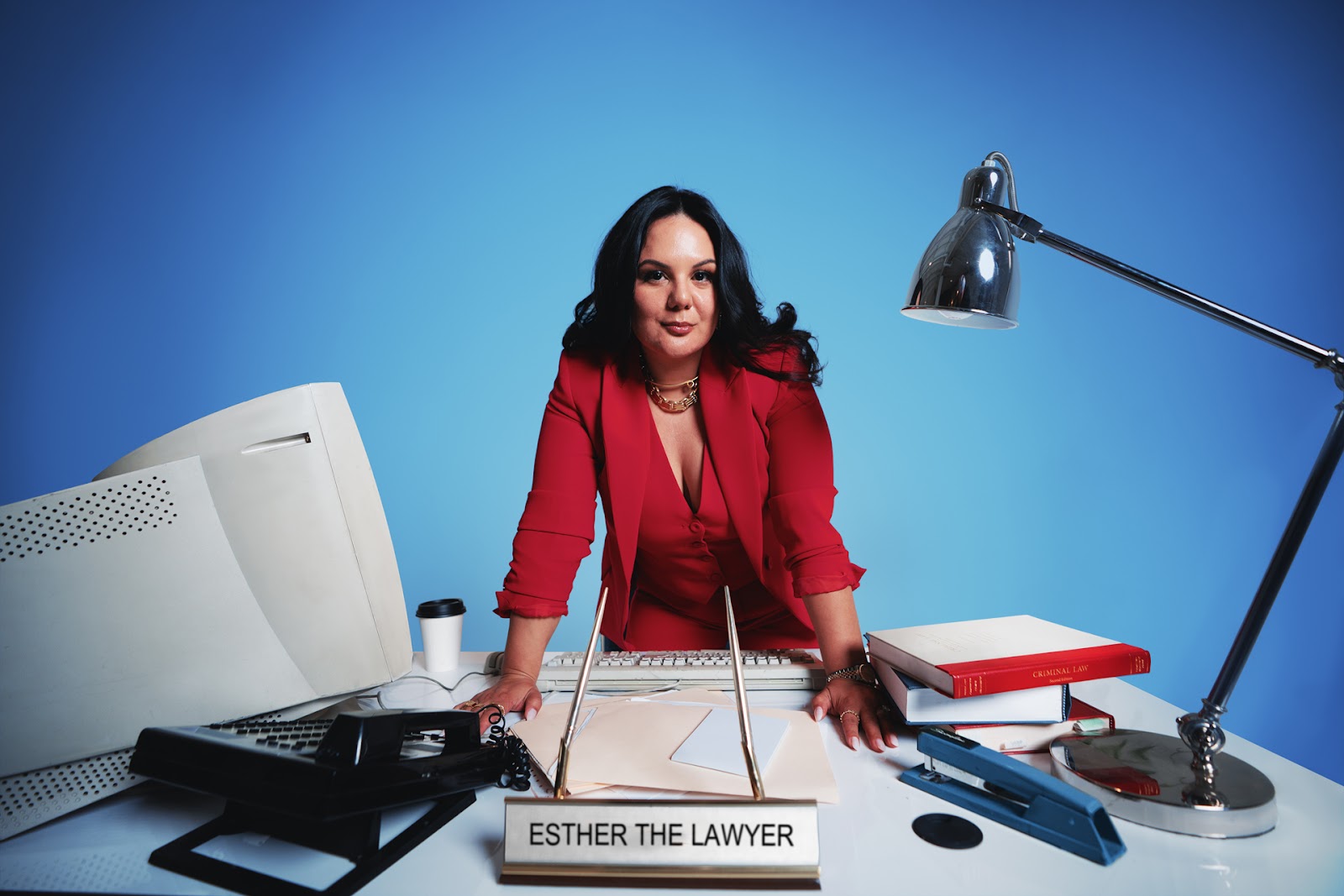

When you file a personal injury claim, you probably hope for a quick settlement and a straightforward process. And honestly, most cases do settle in pre-litigation, but not all. Sometimes, the insurance company won’t cooperate, or they won’t offer the compensation you deserve. That’s when your attorney might recommend taking the case to trial also known as litigation.
For many people, the idea of going to court sounds stressful and overwhelming. You might picture long, dramatic courtroom scenes from TV or feel unsure about what your role would even be.
This article breaks everything down in plain, real-world terms so you know exactly what to expect if your personal injury case goes to trial. And most importantly, why having someone like Esther The Lawyer representing you makes all the difference.
First Things First: Most Cases Don’t Go to Trial
Let’s get this out of the way, the vast majority of personal injury claims (around 90% or more) settle out of court. Going to trial usually happens only when:
- The insurance company denies liability
- They offer a low settlement that doesn't cover your losses
- There are major disagreements about how the accident happened or how severe your injuries are
When settlement isn’t an option, trial becomes your path to justice. And if you’re working with an experienced trial attorney, you’ll be in good hands.
What Is a Personal Injury Trial?
A personal injury trial is a formal legal process in which a judge or jury hears both sides of a case and makes a decision. You, the plaintiff, and the defendant (usually an insurance company or business) each present evidence, testimony, and arguments.
The goal? To determine whether the defendant is liable for your injuries and, if so, how much they should pay you.
It’s not just about telling your story; it’s about proving your case.
Step-by-Step: What Happens in a Personal Injury Trial
Let’s walk through what typically happens when your personal injury case goes to court in California:
1. Pre-Trial Preparation
Before the trial even begins, your legal team will spend weeks or months preparing. That includes:
- Gathering all documentation (medical records, accident reports, witness statements)
- Interviewing expert witnesses
- Filing pre-trial motions (such as requests to exclude certain evidence)
- Developing your trial strategy
With Esther The Lawyer, this stage is handled thoroughly. Esther prepares every case with trial in mind, even if it’s likely to settle, so there are no surprises in court.
2. Jury Selection
In most personal injury cases, you’ll have a jury. That means your attorney and the defense will go through a process of selecting fair and impartial jurors.
Your lawyer will seek jurors who can fairly consider your case and remain open to all the facts. Biased jurors (like those who work in insurance or have had negative experiences with lawsuits) can be dismissed.
3. Opening Statements
Now, the courtroom phase begins. Both your attorney and the defense attorney will make opening statements, essentially an overview of what they plan to prove.
Your side will explain:
- How the accident happened
- Why the defendant is responsible
- The extent of your injuries
- The damages you're seeking
It’s like a trailer for what’s to come without the drama.
4. Presentation of Evidence and Testimony
This is the heart of the trial. Your attorney will present your case first, which includes:
- Your testimony (if you take the stand)
- Testimony from witnesses (like family, friends, coworkers)
- Medical experts explaining your injuries and recovery
- Accident reconstruction experts, if needed
- Visual evidence (photos, video, diagrams)
Then the defense will present their side, usually downplaying your injuries or arguing that someone else is to blame.
5. Cross-Examination
Both sides can cross-examine each other’s witnesses. That means your attorney can question the defense’s experts or witnesses, pointing out inconsistencies or weaknesses.
This is where strategy and experience matter. Esther The Lawyer knows how to stay composed, ask the right questions, and protect you from getting tripped up.
6. Closing Arguments
After all the evidence is presented, both sides make closing arguments. These are the final summaries, the last chance to persuade the judge or jury.
Your attorney will connect all the dots: liability, negligence, damages, and your right to full compensation.
7. Jury Deliberation and Verdict
The jury then goes into a private room to deliberate. This may take hours or days, depending on the case.
They’ll decide two key things:
- Is the defendant legally responsible (liable) for your injury?
- If so, how much compensation should you receive?
In a bench trial (no jury), the judge will make this decision.
How Long Does a Trial Take?
A personal injury trial can last anywhere from a few days to several weeks, depending on:
- The complexity of the case
- Number of witnesses
- Court schedule
- Legal motions or delays
It’s not always fast, but it’s thorough and a solid path to getting justice when settlement fails.
What Damages Can You Win at Trial?
If you win your trial, the court will award damages to cover your losses, which may include:
- Medical bills (past and future)
- Lost wages and future income
- Pain and suffering
- Emotional distress
- Loss of enjoyment of life
Your attorney will make sure these are fully documented and presented to the jury.
What If You Lose?
It’s possible, though not common, if your case is strong. If you lose:
- You won’t receive compensation
- You may have to cover court costs (rare in personal injury)
- Your attorney may explore appeal options if there were legal errors during the trial
That’s why having a highly experienced trial lawyer like Esther The Lawyer is so crucial; she prepares for every outcome and fights to make sure your rights are protected.
Should You Be Nervous About Testifying?
Understandably, many people feel anxious about taking the stand in court. But your attorney will guide you every step of the way. You’ll be prepped, practiced, and supported.
The goal is to share your story in a clear and honest way.. You don’t have to be perfect just yourself.
Why Some Lawyers Avoid Trial
Not every personal injury lawyer wants to go to court. Trials take time, energy, and serious preparation. Some firms pressure clients to settle quickly, even if the offer is low.
Esther The Lawyer doesn’t do that. She’s not afraid to go to court. Her reputation for being trial-ready often encourages better settlement offers.
How Esther The Lawyer Prepares You for Trial
When you work with Esther, you’re not just hiring an attorney, you’re gaining a partner. She:
- Prepares your case like it will go to trial
- Walks you through every phase and what to expect
- Coaches you on testifying and handling the court
- Handles all communication with the opposing counsel
- Fights for the highest compensation possible
With Esther, you’re never in the dark. You’re never alone. And you’re never unprepared.
What to Do If You Think Your Case May Go to Trial
If your case is stalling or the insurance company keeps denying fair compensation, talk to your attorney about the trial.
Here’s what you can do now:
- Keep all documents – medical bills, pay stubs, doctor’s notes.
- Follow your treatment plan – don’t skip appointments.
- Stay in touch with your attorney – be responsive and honest.
- Ask questions – no concern is too small.
And most importantly, choose a lawyer who’s ready to take your case all the way if needed.
Final Thoughts: Trial Isn’t the End - It’s a Path to Justice
Going to trial may sound stressful, but it’s sometimes the most powerful way to get what you deserve. If you have the right attorney, you won’t be walking into the courtroom alone. You’ll walk in prepared, backed by facts, and confident in your right to justice.

Work With a Lawyer Who’s Ready to Win
If you’re dealing with an insurance company that refuses to do the right thing or if you just want peace of mind that you’re in good hands, it’s time to talk to someone who won’t back down.
Esther The Lawyer is known across Los Angeles for her fierce representation, compassionate approach, and track record of success in and out of the courtroom.
📞 Schedule your free consultation today.
CALL OUR OFFICE TODAY! (323)609-5000
📧 Email: info@estradalawgroup.com
📱 Instagram: @estherthelawyer | @estradalawgroup
📱 TikTok: @estherthelawyer
Don't settle for less - let Esther fight for what you truly deserve.
________
Frequently Asked Questions About Personal Injury Trials
Do all personal injury cases go to trial?
No. Over 90% of personal injury cases settle before trial. Going to court usually happens when the insurance company denies liability or offers a very low settlement.
How long does a trial take?
It depends on the complexity of the case, number of witnesses, and court schedules. Most trials last a few days to a few weeks, but preparation takes months.
Will I have to testify?
Most likely, yes. But your attorney will prepare you thoroughly, so you feel confident and know what to expect.
Can I still settle during trial?
Yes. Many cases settle during trial if the other side realizes your case is strong.
What happens if I lose?
You won’t receive compensation, but your attorney may explore an appeal if there were legal errors. This is why having an experienced trial lawyer is so important.
Quick Legal Terms Explained
- Plaintiff: The person filing the lawsuit (you).
- Defendant: The person or company being sued.
- Liability: Legal responsibility for causing harm.
- Damages: The money awarded for injuries, losses, and suffering.
- Deposition: Sworn testimony taken before trial.
Quick Tip
Keep all medical bills, pay stubs, and doctor’s notes organized. These documents are critical evidence that can make or break your case.
Heading 1
Heading 2
Heading 3
Heading 4
Heading 5
Heading 6
Lorem ipsum dolor sit amet, consectetur adipiscing elit, sed do eiusmod tempor incididunt ut labore et dolore magna aliqua. Ut enim ad minim veniam, quis nostrud exercitation ullamco laboris nisi ut aliquip ex ea commodo consequat. Duis aute irure dolor in reprehenderit in voluptate velit esse cillum dolore eu fugiat nulla pariatur.
Block quote
Ordered list
- Item 1
- Item 2
- Item 3
Unordered list
- Item A
- Item B
- Item C
Bold text
Emphasis
Superscript
Subscript



